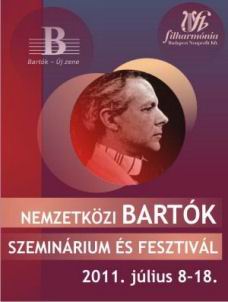|
Scholarly Research and Performance Practice in Bartók Studies: The Importance of the Dialogue An International Musicological Colloquium to Celebrate the 50th Anniversary of the Szombathely (Hungary) 16–18 July 2011 |
To commemorate the 50th anniversary of the foundation of the Budapest Bartók Archives, some of the leading specialists of Béla Bartók’s music were invited for a scholarly conference to be held at the Szombathely Bartók Seminar and Festival in Hungary. The Szombathely Bartók Seminar has had particular significance for Bartók research since its renewal as Seminar and Festival with the motto “Bartók – New Music” from the mid-1980s and it was there that two workshop meetings of the planned Béla Bartók Complete Critical Edition and the 1995 International Bartók Colloquium took place.
Source study, the scholarly edition of works including previously unpublished compositions, the evaluation and analysis of the composer’s own recorded performances of his and other composers’ music have all been central to the activity of the Budapest Bartók Archives since its foundation in 1961. We invited contributions to questions of style and notation in relation to performance practice, as well as analysis of early recordings and comparisons of folkloristic data, a central reference in Bartók’s art, and compositions. Contributions on questions of editing, the significance of editorial decisions in general and the difficulties related to different versions and variant readings in particularly were also encouraged.
The conference also gave opportunity for the staff of the Budapest Bartók Archives to present ongoing major projects, László Somfai’s Béla Bartók Thematic Catalog and the Béla Bartók Complete Critical Edition.
Papers were read in English, German and French.







